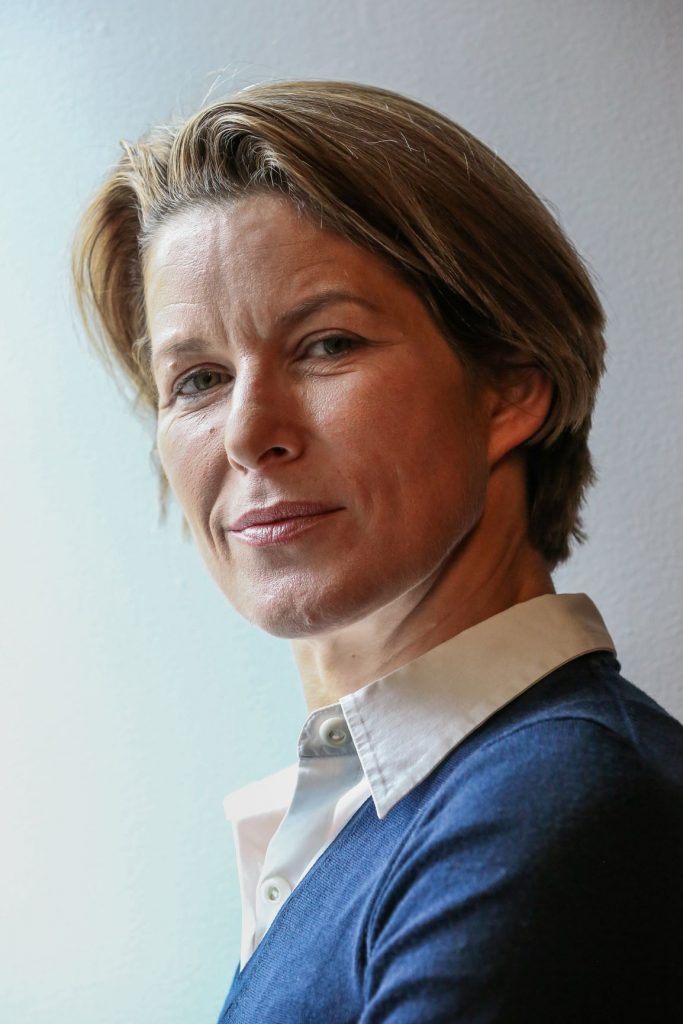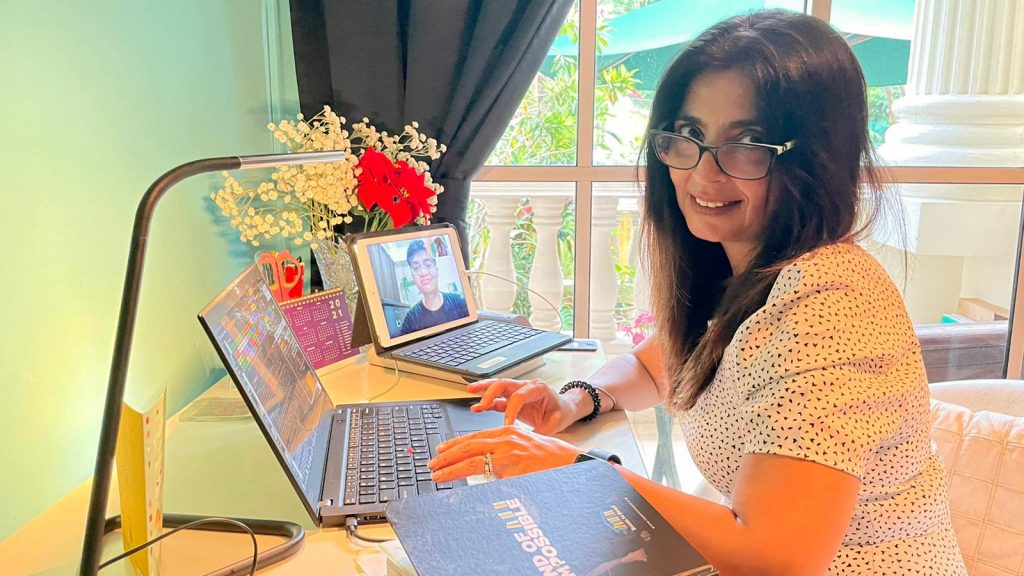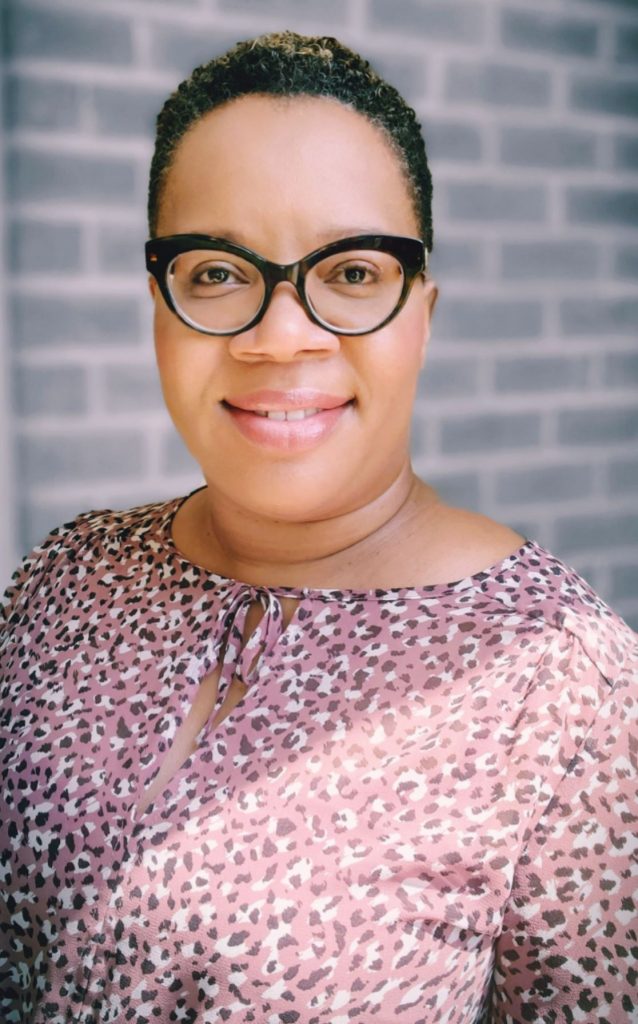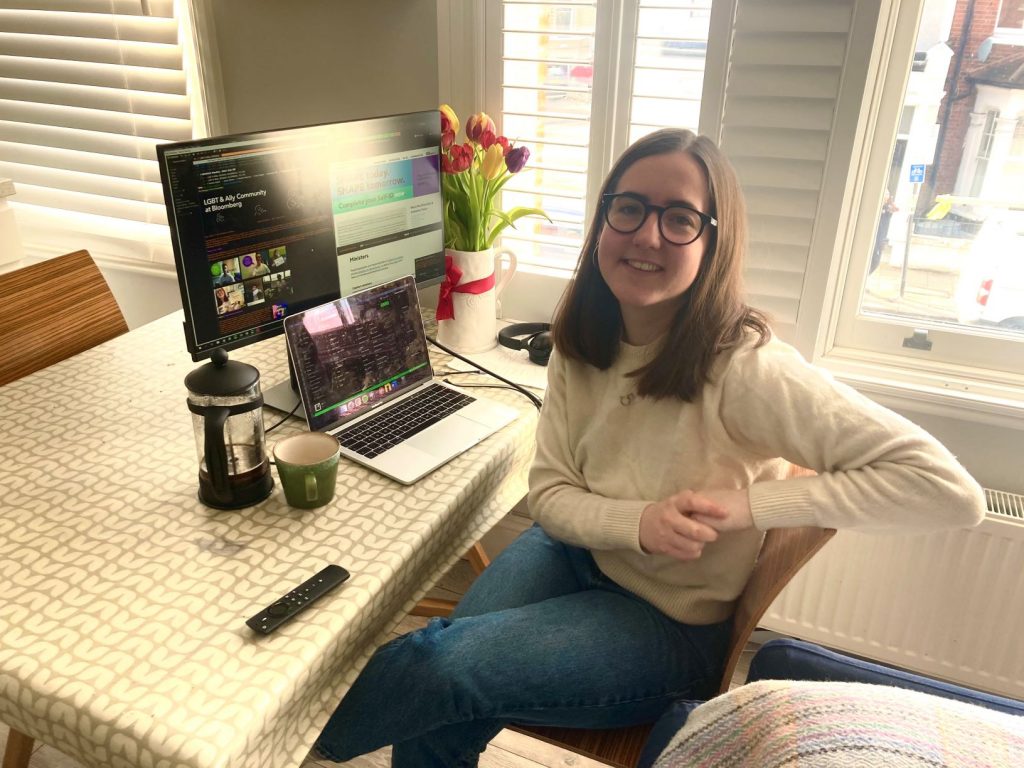Open, candid conversations about diversity and inclusion in our society and workplace must continue in order to support the fight for equality. Thankfully, these conversations continue to take place across Bloomberg, in various forms and forums.
One of the goals of these exchanges is to explore different facets of identity and experience from the first-hand perspectives of employees across the firm.
In this edition, we delve into the lived experiences of our colleagues as they have persisted in breaking glass ceilings and bucking conventions, and shows us how we can best support progress for women in the workplace.
Nayla Razzouk, Dubai
“Bring a new perspective, don’t try to blend in, embrace your differences. Learn something new every day. And most of all, be productive.”
Nayla with the UK Royal Marines while covering the Iraq War in 2003
Nayla grew up during the civil war in Lebanon, and naturally ended up covering these conflicts across the Middle East. She joined Bloomberg in 2010 to cover Iraq and energy/OPEC news, and recently took on the role of Managing Editor for the Middle East and North Africa.
In what way have you broken glass ceilings or conventions? What challenges did you face, and how did you overcome them?
Working as a journalist can have its challenges as a woman, and there are additional challenges in this part of the world, where the circles of power are dominated by men. Often, you’re the only woman in the room or at the front, so it can be intimidating and even dangerous. I’ve encountered situations where people I wanted to interview would try to intimidate me because I was a woman. Some wouldn’t speak to women – I once asked my driver to act as a go-between while I stood behind a door. It can only build character, and this has helped me acquire the confidence to say that I will always find a way to do my job — even more so today, in my new challenge as the first woman to lead the MENA region.
What strengths do you believe your identity and experiences bring to your professional and personal life?
Having grown up and worked in tough environments has helped me acquire assertiveness and an ability to tolerate stress in a calm manner, while showing empathy to others. These traits and experiences were very valuable in leading our teams through COVID-19, making sure everyone is safe, continues to perform well, and knows that they can count on us in uncertain times.
Stephanie Flanders, London
“Though a proud feminist, I would still hesitate to describe any particular attitude or experience as uniquely female.”

Stephanie has been both an economist and an economic journalist — she joined Bloomberg in 2017 and now does both, leading Bloomberg Economics and following a lifelong passion to demystify the global economy for a wider audience.
In what way have you broken glass ceilings or conventions? What challenges did you face, and how did you overcome them?
When I became the BBC’s Economics Editor, I was the first woman to occupy a specialist editor job. Happily, there have been plenty more since then, and in general I would say that economics has become a little less male-dominated over the course of my career. In a previous role, I was aware that I was paid much less than several male colleagues in similar roles. That’s a challenge I failed to overcome, but overall I don’t feel I have been held back by my gender. If anything, it has given me an edge — it’s striking how many of the major global banks now have female chief economists.
What advice do you have for future convention- and ceiling-breakers?
When you’re making a case for yourself, don’t start with the skills you don’t have. I thought it was just an outdated stereotype until I started interviewing women and men for jobs. So many women really do lead with the stuff they can’t do. It’s extraordinary.
Vandna Dawar Ramchandani, Singapore
“Understand and accept that every person and situation is different, so be empathetic and encouraging, and build trust so women feel empowered to share and take risks.”

Vandna was born and raised in India. She joined Bloomberg in 1997 as a Terminal Sales rep, while living in Jakarta, Indonesia, and is now leading Corporate Philanthropy for APAC.
In what way have you broken glass ceilings or conventions? What challenges did you face, and how did you overcome them?
In Asia, particularly in India, a woman’s role is primarily expected to be that of a home-maker. I was committed to growing my career — even after having a family — taking on additional responsibility and relocating. When I first took on the roles of APAC Global Data Manager and then Singapore Office Committee chair, the first female in those roles, I did feel nervous about the step up, but there is so much support at Bloomberg, women just need to believe in themselves and lean in.
The biggest challenge is creating a balance that works for you, and often managing your guilt as a mum. There are no shortcuts so you start to run your life through “to-do” lists and constantly prioritize. My social life and personal time became secondary; my work and family were the priority. I wanted to live the life I dreamed of for my daughter and “walk the talk.”
What strengths do you believe your identity and experiences bring to your professional and personal life?
Authenticity, drive, hard work, empathy, and the desire to constantly challenge the status quo! Multi-tasking is not a choice, so you just become good at it. You learn to problem-solve and be creative, which lends itself wonderfully to a career at Bloomberg.
Nita Ditele-Bourgeois, New York
“Take risks and embrace failures. Be determined, never settle, and let your skills speak for themselves; not your gender.”

Originally from the South, Nita was raised in New York at the heart of a family that fostered continuous learning. She joined Bloomberg in 2007 as a Legal Negotiations Specialist, and is now a Product Operations manager in Enterprise Data.
In what way have you broken glass ceilings or conventions? What challenges did you face, and how did you overcome them?
Last year, after 13 years in Legal, I joined Enterprise Data. I saw an opportunity to leverage transferable skills, challenge myself, and grow. I wanted to be part of an exciting journey with the business from a different vantage point.
After encountering gender stereotypes and micro-aggressions throughout my career, I’ve found that the confidence and determination instilled at young age provided me the resilience and fortitude to address challenges head-on.
What strengths do you believe your identity and experiences bring to your professional and personal life?
Active listening has made the biggest impact. It takes time and intentionality, but the outcomes are enormous: positive engagement, sharing ideas, productivity, and stronger communication between individuals.
Celine Shi, Shanghai
“My experience has really been about breaking ceilings in my own mind.”

A native of Sichuan, China, Celine joined Bloomberg Analytics in 2011 in Singapore before taking on the challenge of expanding team coverage in Beijing. She now manages buy-side product specialists in Shanghai.
In what way have you broken glass ceilings or conventions? What challenges did you face, and how did you overcome them?
Early in my career, I didn’t want to draw attention to my sexual orientation, as I truly believe it has no relevance to how well someone performs at work. I kept my identity as a queer woman to myself, even though Bloomberg has been very supportive and open about our LGBTQ community. I later realized that this secret impacted how comfortable I was with colleagues and friends — I wasn’t being myself. I came out in 2017 and was able to fully embrace my friendships and work relationships, which helped me become more confident and perform better.
What advice do you have for future convention- and ceiling-breakers?
Do not set your own glass ceiling. Many of the women I know feel less confident about opportunities and question themselves: Am I really qualified for this? Do I have what it takes? We should be more confident in the different values and experiences we bring, and give ourselves a chance to be seen.
Deanna Hallett, London
“Seek out individuals and groups of people who will support you, lift you up, challenge you, and affirm your identity and your goals — no one can reach that glass ceiling alone.”

Deanna interned for Bloomberg twice before joining full-time after graduating university in 2019. She currently works in UK government and regulatory relations and is the co-lead for the LGBTQ+ and Ally Community in EMEA.
In what ways have you broken glass ceilings or conventions?
I was the first woman in my family to apply to university, the first to run for local councillor, the first to move abroad, and the first woman to come out as LGBT+ in my family. I faced a lot of challenges growing up, including poverty, and psychological and physical abuse from my father, which was particularly acute when I came out as gay. More broadly, I grew up in an environment where I was just expected to manage, have kids, and then become a full-time mum. It was difficult pursuing my own goals and independence when it didn’t marry the view of what my family expected.
What can our colleagues and communities to do become better allies to women in the workforce?
Actively listen. It’s only by taking into consideration people’s experiences that we can ensure the glass ceiling is shattered for all women — particularly LGBT+ women and women of colour, who are too often left behind.
Click here to read the full article on Bloomberg.



